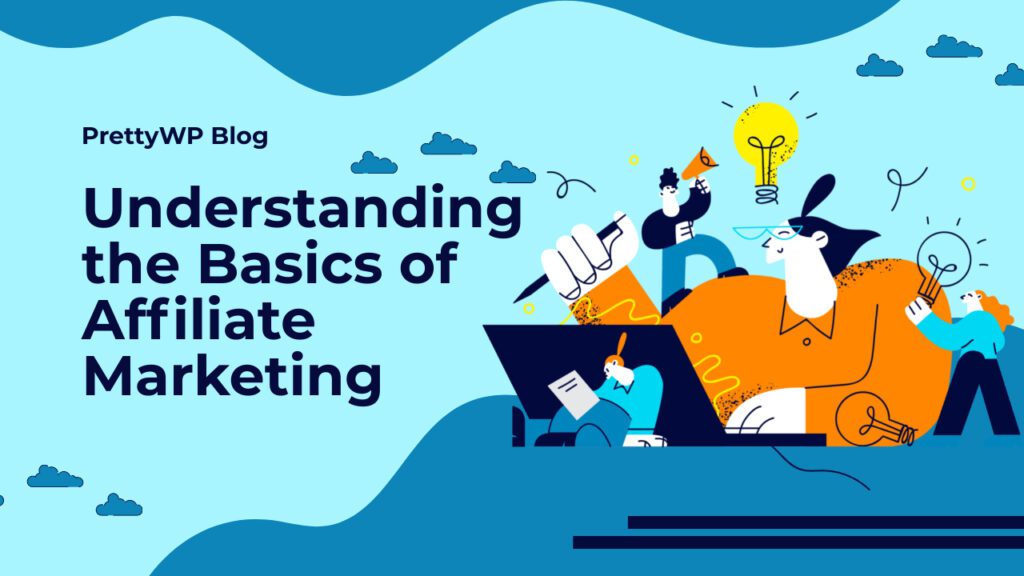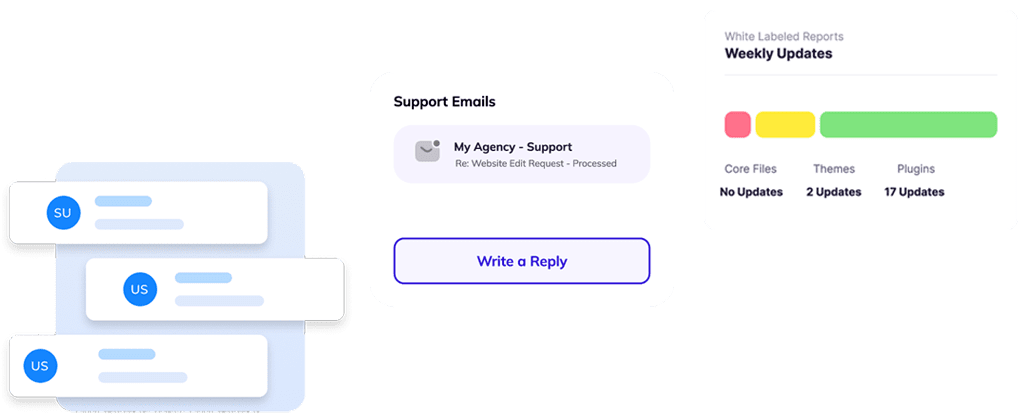If you’ve ever wondered how affiliate marketing works, you’re in the right place. Becoming a part of this multi-billion dollar industry isn’t as complex as you might think. At its core, it centers around promoting other people’s products, often through an affiliate network, earning a commission if people end up buying through your marketing links. Sounds simple, doesn’t it?
Well, let’s back up a moment. Affiliate marketing rests on the principle of mutual benefits. It’s a symbiotic relationship between the merchant, the affiliate, and the customer.
Let’s explore why it could be the perfect addition to your strategy whether you’re a blogger, an eCommerce merchant, or a service provider.
What Is Affiliate Marketing?
When you think about making money online, Affiliate Marketing likely comes to mind. But what is it exactly? At its most basic, Affiliate Marketing is a strategy where an individual or business earns a commission by promoting someone else’s product or service. You, as the affiliate, simply search for a product you enjoy, advertise it, and earn a piece of the profit for each sale you make.
How does it work?
Affiliate marketing is a performance-based marketing strategy where a business rewards one or more affiliates for each visitor or customer brought by the affiliate’s own marketing efforts. The process begins when an affiliate partners with a merchant, also known as an advertiser. The affiliate then promotes the merchant’s products or services on their website, blog, social media platforms, or other online platforms. They use unique tracking links provided by the merchant to track the traffic and sales they send to the merchant’s website.
When a potential customer clicks on these links and completes a purchase, the affiliate earns a commission. The commission rate is agreed upon by the affiliate and the merchant and can be based on a percentage of a sale, a fixed amount per lead, or a flat fee for the signup of a new customer.
Affiliate marketing can be beneficial for both the merchant and the affiliate. For the merchant, it’s a way to reach a wider audience and increase sales without the need for a large marketing budget. For the affiliate, it’s an opportunity to earn income by promoting products or services they believe in or are relevant to their audience.
What are the key benefits of affiliate marketing?
One of the primary benefits of affiliate marketing is its cost-effectiveness. Businesses only pay commissions when the desired action – typically a sale – has been completed. This makes affiliate marketing a performance-based method, reducing the risk of investing in marketing that may not yield returns. Affiliate marketing also allows businesses to expand their market reach. Affiliates can be found in every market and product category that exists today. This enables a brand to enter markets that would have been otherwise hard to penetrate.
Another advantage of affiliate marketing is its ability to be easily scaled. As the business grows, it can add more affiliates to the network, increasing the potential for sales without a significant increase in effort or cost.
Affiliate marketing also provides a level of transparency that is often lacking in other marketing strategies. Through various tools and software, businesses can track the performance of their affiliates, including click-through rates, conversions, and overall revenue.
Lastly, affiliate marketing can help improve a brand’s reputation. By partnering with trusted bloggers and reputable websites, businesses can enhance their credibility in the eyes of consumers. These partnerships can also lead to valuable backlinks, which can boost a website’s search engine ranking.
Common types of affiliate marketing
Affiliate marketing can be categorized into several types based on the relationship between the affiliate and the merchant, the payment model, and the promotion methods used. One common type is Pay Per Sale (PPS), where the affiliate earns a commission when a sale is completed. The affiliate promotes the merchant’s products or services and gets rewarded only when their referral converts into a sale.
Pay Per Click (PPC)
In contrast, Pay Per Click (PPC) affiliate marketing revolves around the affiliate getting paid for all the clicks that are generated from their affiliate links. This model doesn’t require a sale to be made. Instead, affiliates are paid for driving traffic to the merchant’s site.
Pay Per Lead (PPL)
Pay Per Lead (PPL) is another type of affiliate marketing where affiliates are paid for every lead they generate. A lead could be a form submission, a sign-up, or any other action that the merchant considers valuable.
Content
Content affiliates use content (like blog posts, videos, or reviews) to promote affiliate products. They typically have a niche focus and aim to provide valuable content to their audience, embedding affiliate links within this content.
Coupon and Deals
Another type is Coupon and Deal affiliates. These affiliates use discount codes and promotional deals to drive sales. They typically run websites or apps that are dedicated to showcasing the latest deals and discounts.
Reviews and Promotions
Lastly, Review affiliates promote products by providing in-depth reviews. They may compare different products, highlight pros and cons, and provide personal insights, with the aim of helping consumers make informed purchasing decisions.
Can affiliate marketing really generate income?
Indeed, affiliate marketing can truly generate income. It’s not only possible but increasingly popular because of the earning potential it gives to those willing to commit.
Using affiliate marketing, you take a commission-based role to promote products or services. You gain profit from each sale made due to your marketing efforts. Remember that profit margin can vary. It primarily relies on the agreed percentage or fixed amount per conversion between you and the merchant.
Here’s the interesting part: as an affiliate marketer, there’s no cap on your earnings. It’s not like a salaried job where you have fixed compensation. Affiliate marketing is performance-based. The more successful conversions you facilitate, the more profitable it is for you.
From promoting niche products to endorsing high-demand services, the income potential can be significant if strategized properly. Many affiliate marketers have turned this into a full-time career, with success stories of earning figures over a 6-digit mark annually.
However, it’s important to understand that like any other business, this doesn’t guarantee immediate riches. It requires strategic planning, time investment, and a solid understanding of your target market. And there might be initial struggles and slow progress. But, with perseverance and the right strategies, affiliate marketing has the potential to offer you a strong, passive income source.
So, to answer your question simply, can affiliate marketing really generate income? Yes, it can. But as with anything worth doing, the key is to approach it with knowledge, dedication, and patience.
Successful strategies in affiliate marketing
You’re probably intrigued about the potential rewards of affiliate marketing, right? Let’s discuss a few more successful strategies that you can use to enhance your affiliate marketing game. Remember, the aim is to deliver value while earning commissions.
- Choose the Right Products: One successful strategy in affiliate marketing is to choose the right products or services to promote. It’s essential to select products that are relevant to your audience and that you believe in. This not only increases the likelihood of conversions but also helps to build trust with your audience.
- SEO: Another strategy is to use SEO techniques to drive organic traffic to your website or blog. By optimizing your content for search engines, you can increase your visibility and attract more potential customers. This includes using relevant keywords, creating high-quality content, and building backlinks.
- Content: Creating valuable content is also a key strategy in affiliate marketing. This can be in the form of blog posts, videos, podcasts, or other types of content that provide useful information to your audience. By offering value, you can build a loyal audience that is more likely to engage with your affiliate links.
- Social Media: Using social media platforms can also be beneficial. By promoting your affiliate products on social media, you can reach a wider audience and drive more traffic to your site.
- Email Marketing: Utilizing email marketing is another effective strategy. By building an email list, you can directly communicate with your audience, promote your affiliate products, and build a relationship with your subscribers. This can lead to higher conversion rates as your audience becomes more familiar with you and the products you recommend.
- Analyze the Results: Lastly, tracking and analyzing your results is crucial for success in affiliate marketing. This allows you to understand what’s working and what’s not, so you can make necessary adjustments. Tools like Google Analytics can help you monitor your traffic, click-through rates, and conversion rates.
Can affiliate marketing be a full-time job?
Yes, affiliate marketing can become a full-time job. Thanks to its flexibility, you can work from anywhere, anytime.
A lot of people have made a career from promoting products and earning commissions through affiliate marketing. However, it’s not an instant process. Converting affiliate marketing into a regular job needs hard work, dedication, and certain marketing skills.
Skills like understanding SEO, creating engaging content, and being good at sales are key to success. Also, just like any other profession, affiliate marketing demands ongoing learning and staying updated with new market trends. Patience plays a crucial role too, as it might take several months to witness notable results.
So, affiliate marketing definitely can be a full-time job, but its success is highly dependent on your commitment, time, and strategy.
What are the benefits of using affiliate marketing for your business?
Imagine a marketing strategy that requires no upfront advertising costs, focuses heavily on driving revenue, and enables you to align with other brands relevant to your business. Sounds too good to be true? Fortunately, it isn’t. This is exactly what affiliate marketing can offer to your business.
Cost-Effective and Risk-Free
Affiliate marketing is a performance-based marketing method. This means you only pay when a desired action, such as a sale or a lead, occurs. It’s a much more cost-effective solution because you’re not wasting money on promotional efforts that may or may not result in sales.
Expand Your Audience
By partnering with affiliates who already have an established audience, your product or services can be introduced to markets you might not have access to otherwise. Affiliates can be anyone, anywhere – this gives your business a global platform.
Brand Awareness
Through affiliate marketers, your brand can be exposed to a larger audience. This increased exposure leads to better brand recognition, and over time, this strengthens your brand’s credibility.
Organic Website Traffic
Affiliate links direct traffic back to your site. This influx of web traffic can be highly beneficial, especially if you’re employing good SEO practices, as it can help increase your site’s ranking on search engines.
Generate More Sales
Ultimately, the goal of any marketing strategy is to increase revenue. By reaching out to a wider audience and driving traffic back to your site, you set the stage for higher conversion rates and more sales.
In summary, not only can affiliate marketing help you save on marketing expenses, but it can also drive traffic, boost your brand, and increase your revenue. And the best part? You can track all these metrics easily with analytics tools, giving your marketing efforts transparency and enabling you to make data-driven decisions.
What are the potential risks of affiliate marketing?
Like all marketing strategies, affiliate marketing has its pitfalls. Here are some potential risks that you need to be aware of:
Reliance on Affiliates
While affiliate marketing can bring a lot of benefits, it also makes you heavily reliant on your affiliates. Your business success can be influenced by their marketing skills, efforts, and ethics. Therefore, if they use unethical methods or simply don’t perform well, it can negatively affect your brand reputation and bottom line.
Brand Misrepresentation
Affiliate marketers have the freedom to market your products in their own way. This means that they have the power to potentially misrepresent your brand. If an affiliate uses strategies that do not align with your brand’s mission or values, it can create a discord between your brand and its customers.
Fraudulent Activities
Some affiliates may use deceptive practices to earn commissions, such as generating fake clicks or sales. These fraudulent activities not only can lead to a waste of resources but also result in poor customer experiences.
Low-Quality Traffic
Affiliates may generate traffic to your websites. However, the quality of this traffic can vary. Poorly targeted, low-quality traffic may lead to low conversion rates. As a result, you may see a lot of inbound traffic, but little to no growth in sales.
Keep in mind, understanding these risks better prepares you to create a great affiliate marketing plan. It’s all about choosing the right affiliates, clarifying what you expect from them, and regularly checking on their actions.
Final Thoughts
In short, affiliate marketing is a smart way to make money that benefits both businesses and marketers. We’ve looked at how it helps businesses reach more people and get their name out there while keeping risks low. At the same time, marketers can make a good income from it, possibly even to the point of making it a full-time job.
But like all business ventures, it does come with risks. You need to be careful because there’s a strong reliance on affiliates and the chance of your brand being misrepresented. It’s equally important to be aware of fraudulent actions and the risk of attracting low-quality visitors to your site. Yet, if you understand the principles of affiliate marketing, it can be a successful strategy.
The success of affiliate marketing largely depends on how well you know your audience, pick the right products, and promote them genuinely. Remaining consistent, showing patience, and producing high-quality content also play a big role. These key points can really set you up for success as you start your affiliate marketing journey.
We hope this guide gives you a clear understanding of affiliate marketing and gives you the confidence to take advantage of what it has to offer.
And hey, don’t forget to check out PrettyWP’s Affiliate Program!













